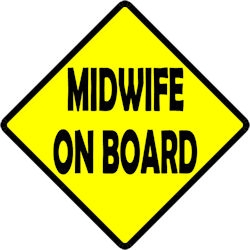 I'm not here to scare you, and you're probably already aware that in the 1950's and 60's, birth wasn't a kind animal to women. The medical industry was very excited about various "advances" in technology that left women completely out of their own birth experiences. In addition to using full anesthesia, surgeons often used forceps to deliver babies of first time mothers. This was based on bad science and I'm so grateful that we live in the world we do now, where forceps are truly reserved for times of absolute necessity. Sometime in the late sixties, a woman named Ina May Gaskin was thrilled to give birth to her first child. Determined to be a "good patient" and avoid pain medication and forceps, she stayed perfectly quiet all through her labor and tried not to attract attention. Unfortunately for her, it didn't matter. She received an episiotomy, a forceps delivery, and was separated from her baby for the first 24 hours of her life because that was the standard protocol at the time. Rather than submitting to the "standard protocol" for her subsequent births, she looked beyond the latest and greatest evidence and back in time to the way that women have been birthing their babies for millennia: at home, surrounded with like-minded women. She found a woman (Joanne Santana, pictured on the left) who had birthed a baby at home with the help of a midwife. This was the spark that she needed to set fire to the establishment of torturous birth. She and her sister-friends started a commune in Tennessee that was founded on hippie ideals like peace, love, and empowerment. For forty years now these women have salvaged the vestiges of midwifery and rekindled the practice of woman-centered birth. I spent the last seven days learning from these midwives, hearing their stories, and soaking up their strange blend of spirituality and sisterhood, and I am forever changed. Midwifery is good science with boundaries, reason, heart, and history. It offers women support to birth their babies and respects the need for intervention and surgery for those outside of those bounds. Rest assured, this is not me recommending home birth to everyone. Instead, this is me encouraging you to read Ina May's books and discover a softer side of birth. Ina May's Guide to Childbirth, Ina May's Guide to Breastfeeding, and Spiritual Midwifery. I wish for you inspiration, empowerment, peace and love in your prenatal care and birthing experience. I know this is possible. Do you?
0 Comments
 On occasion, I receive correspondence from various people asking me how I know what I know about birth and motherhood, since I have no children of my own. They want to know where I trained and what sort of "hidden agenda(s)" I might have. I take this as a compliment. There is a lot of varied information out there about childbirth, motherhood, fashion, and nutrition. I'm so thankful I don't have to know everything there is to know about those things. I don't know everything there is to know about childbirth and motherhood! And if you've ever met me, you know I'm hopelessly fashionless. My credentials are outlined on my website, if you want to know what all of the fancy letters mean (squat, in fact). So while you're here, please enjoy the laundry as I air out my closet. I believe: The baby will come out. It's amazing, but true. You will not be pregnant with this baby forever, and you can probably give birth vaginally. If your provider says you can't, and you want to, ask lots of questions and/or get a second opinion. The overwhelming majority of the time, a women grows a baby/babies she can give birth to. It does not make sense that we have lived 3.5 million years on Earth by growing babies too big to birth. It's a tight squeeze, and in very rare cases it is not physically possible. We are lucky to have modern medicine and obstetric care. When problems arise, babies come early, mamas get sick, or accidents happen, we are incredibly fortunate to have access to lifesaving procedures, medications, and information. Doulas are superheros. And worth every penny, even if you love your provider, your spouse and your mother and want everyone in the room when you give birth. What's a doula? How do you choose? How do you hire me as your doula? You are not expected to know everything about birth before you have your baby. And if you do, it's a waste of time. You are not going to turn around and deliver the next baby, you just need to know enough to feel confident in your team. A birth class will tell you what you need to know. The internet is for porn. (That's a line from a musical). The internet is not for birth or mothering advice! There are safe places where you can get good, reputable information, and great places where you can network and commiserate about how long it has been since you peed alone. Dr. Google is not your friend. What to Expect When You're Expecting is not worth your time. This book is about being afraid. Being very afraid. The authors forgot that birth is normal and that everyone walking around was born. I recommend these alternatives. Breastfeeding is normal, natural, and possible (and comes with some hurdles). The hurdles are real and without help, it can feel impossible to move forward. Help exists. Learn about it. Please ask me. Everyone is trying to sell you things, because you're part of a "market." For instance, I would like you to come to my classes. Other people want you to buy things not because you need them, but because they are selling them. This includes me. You don't need prenatal yoga. You don't need a crib skirt. Right? Boobs and a carseat are the only things you actually need before baby comes. If you're pregnant, you're halfway there. You can buy things later, I promise. Motherhood isn't all roses and rainbows. Everyone has a different journey to motherhood, with different baggage. You do actually need Mom & Me yoga to form a community where you can remember that you're doing everything right (even when you do something wrong). There are bad mothers out there, but you're probably not one of them. Everyone tells me, "I'm such a bad mother!" Then they talk about the time they put junior in mismatched socks, or turned their back and he rolled off of the couch, or gave him formula. Everyone makes mistakes, and mistakes do not make you a bad mother. You are beautiful. Yep, you. Even if you're covered in spit up or your ankles are as wide as your hips. Mama lions are amazing and so are you. Rawr. That's my agenda. I reserve the right to amend it at any time. What did I miss?  So you're about to become a mother... what kind of mother do you think you will be? Maybe it is something you have always considered: you've always cared for children, or you've idealized a mama from your past, or you are literally just hoping that you're not “that mom” on the news. Whether or not you know it, you have a mama archetype in your toolbox already. She's in there with all of her quirks and good graces. She's just waiting to hatch when your baby does. Nothing to worry about? Not so fast. Your mama archetype carries with her all sorts of good, but she comes with a shadow-side, too. It's worth peeking under the hood to see what she might look like before she arrives. How? Consult Your Mama Baggage: We all have mama baggage. Some of us have small, day-trip bags. For instance, your mama always made you take off your shoes immediately when you came in the house. She insisted that franks and weenies be served exclusively with canned corn? Do you do the same thing now? Um hum. These are quirks. They are funny, annoying, and may possibly result in tears. But they are like day-trip baggage. Some of us have larger bags, like mamas who had what may have possibly been diagnosable psychological conditions. If you can recall your mother seeming totally withdrawn, or yelling at you, your siblings, or a host of individuals only she could see, it is worth talking about this with a therapist before you become a mother yourself. Perhaps you've already processed the difficult situations you grew up with, but you have a new lens. Prepare now. Some of us have second homes. Mama baggage isn't necessarily bad things your mother did, they may be bad things that happened to her. Perhaps she passed away when you were young, or perhaps she abandoned your family. This doesn't mean you don't have any ideas about what it is like to be a mother... you may have more ideas than are physically possible in one lifetime as you assembled a mother-figure from family members, friends, and media icons. You may have set a standard for yourself that is completely unattainable. If you have the resources (like time and money), you can certainly chat with a counselor or therapist about your relationship with your mother. They might help you release the grasp on the “right” way to pack a lunch, help you anticipate any predisposition you might have for postpartum mood disorders, or support you as you build up or whittle down your idea of motherhood. If you're not sure, you can spend a little time journaling. Write down your ideas of what it means to be a mother, great mother stories, and other relevant details. Talk with your friends about their experiences becoming mothers and what surprised them. Begin to write your own story of what the motherhood journey will look like for you.  Perhaps you're nearly as confused as I was about what a “midwife” does (versus what a “doula” or your “mother-in-law” might do to support you during labor). Let me spell it out for you in super plain English. Homebirth Midwives: Are able to practice well-woman care, like pap smears and exams, and attend the births of healthy women carrying healthy pregnancies. They do not prescribe prescription medication, nor do they offer medical pain relief methods or procedures. Most often their care includes visits to your home before and after baby is born. Appointments with home birth midwives tend to be longer and more frequent than with other birth attendants. Certified Professional Midwife This woman has trained for years in both an academic and practical setting and then passed two grueling exams: one on paper, another eight-hour practical exam. It is the only credential that requires experience delivering babies both inside and outside of hospital settings. Legally, CPM's can practice in 26 states (although each state sets the standards for who may or may not practice in a medical setting like a hospital or birth center). http://www.nacpm.org/what-is-cpm.html Registered Midwife (in Colorado) This woman has trained for years in a variety of settings, from academic to apprenticeship. She must register with the state of Colorado and is the only birth professional permitted to attend home births. They must either take a training program through a recognized school or provide proof of equivalent experience and education. http://www.coloradomidwives.org/registered-midwives-and-certified-nurse-midwives Hospital Birth Midwives Somewhere between a homebirth midwife and an OB/GYN, a hospital birth midwife frequently works with healthy women carrying healthy pregnancies, but is also trained in the medical model and may offer medical interventions like pharmaceutical drugs and minor surgical procedures. Hospital birth midwives work in a medical office and do not travel to your home before or after baby is born. Their appointment times are often longer than the appointments of an obstetrician seeing a healthy pregnant woman. Certified Nurse Midwife This individual (the majority of whom are women) has a bachelor's degree in nursing and then a post-graduate degree (two years) in labor and delivery. She must practice within the scope of an obstetrician, meaning her philosophy of care is supervised/directed by a physician. http://www.midwife.org There are a whole host of organizations that offer credentials to midwives, and that is because there did not used to be a single organization. Each state had to define their own rules regarding midwifery care. Your midwife may carry a credential that is not listed here, and she may still be an excellent caregiver. Regardless of the midwife you choose, you should know that your midwife is NOT a DOULA, or a person who is dedicated as a labor support person. Midwives provide perinatal health care, but will not arrive at your labor as soon as it begins. Typically, you make several phone calls to your midwife as your labor progresses and s/he evaluates when to meet you at your house/hospital. Some home birth midwives are also trained as doulas, but they will not perform both functions at once. In the event you need or choose to transport to a hospital, your home birth midwife may serve as a doula depending on her training and scope of practice. Clear as mud? Great. Have a conversation with your provider about what services they offer and whether you'd like to invite a doula to assist you or work with the assistance of a family member/friend. Interested in learning about whether a doula is right for you?  My BFF's husband, Brian. Holding a walnut. If you're expecting a baby or have a new baby at home, you might feel slightly overwhelmed? No? You might feel like it is imperative that you know absolutely everything about pregnancy, breastfeeding, motherhood, immunizations, daycare, and kegels? I know these are understatements, because every time I meet a new mama or a mama-to-be, I see a wild-eyed, information-starved, overloaded woman who just wants to know everything. I can relate to the overwhelm and the constant drive to learn more. A few years ago I worked as a patient advocate for clients living with HIV, and I remember frantically searching the internet for answers, calling pharmaceutical reps so that I could confirm suspicions before confronting doctors, and literally standing in the doorway to keep a doctor in the room until he gave me what I wanted: one more test for my client. This is the Mother Lion behavior, a true testament to one's willingness to find their voice on behalf of someone else. Are you thrilled about being a mother lion? I'll wager you'd say half yes, and half no. And you're right on target. I'm about to give you the skills to be the mother lion on behalf of your child and for your own health as well, and it thankfully involves little internet research, bargaining, bribing, or accusations of wrongfully detaining a physician against his will. Which may or may not be a crime in Colorado. I recently took a training from CAPPA to become a certified lactation educator, and during that training I learned a very important acronym that sums up exactly what you need to know. Because I'm afraid of intellectual property and all that jazz, I've modified it a bit to become my own. CAPPA encourages clients to use their BRAIN when they must make a medical decision, so I'll recommend you ask BRIAN. My version comes with a handy cop-out, should you ever need to leave the room. Instead of saying, "I'll have to consult my brain" you can easily say out loud to yourself or to your partner, "I'd like to run this by BRIAN." Hint. Hint. When confronted with a medical decision (someone suggesting a procedure, medication, or other treatment), ask BRIAN. Well, BRIAN E. And remember, if there are two patients involved (you and baby) make sure to ask the question for BOTH of you. Often mamas defer to what is healthy for baby without asking what she might experience, too. If you want your baby to have the best care available, you must make sure your baby has a mother well enough to deliver that care! Benefits. What are the benefits of this treatment? This is something the person will likely list for you automatically, but occasionally they do not articulate the benefits because they believe the treatment to be the best option out there, or possibly accept it as common practice. No harm in getting the skinny (with sources, if you're hesitant or want to do your own research). Risks. What are the risks of using this medication or treatment? This is also something they are likely to disclose, but not always in conversation. Usually these are the items listed on a release waiver, informed consent paper, or literature from the manufacturer of the medication or treatment. Intuition. What does your gut say about this treatment? This is why you might need a few minutes away from the person offering the treatment so that you can gut-check. Does your gut check matter? Only to you. This isn't some wacky hippy yoga instructor gobbledygook. This is actual science, from a medical anthropologist. People must believe that the treatment/medicine they will take can work. Even clinically tested medications do not work all of the time, and they work less well and less often if the patient has no faith in them. You will actually know how you feel instantly, but it might take you a little while to articulate how you feel. Give yourself a little time, if you can (see N). Alternatives. Ask what other possibilities exist besides the recommended course of action. Perhaps there are a few that have their own benefits and risks, but if you'd like to be an informed consumer, ask for the names of other medications or treatments so that you can do a little of your own research. This is also a great time to ask the provider why they would select the option they are recommending instead of these procedures. Sometimes it is because they believe the course of action is the best for you, and sometimes it is because they are more familiar with what they are suggesting. If their answer is "I don't feel comfortable performing that procedure myself," you probably don't want them to perform it, either! That doesn't mean the procedure itself is inherently flawed, it may mean you need a referral to someone else. Nothing. What would happen if you took no action? Are there risks for waiting to do this treatment or start this medication? When will the window of opportunity close? Expert. This is my bonus addition. I know it makes Brian a little tougher to remember, but you can write it on your hand if you must! Ask the person who is suggesting this medication or treatment to refer you to an expert on the topic. Even if they are an expert, there is nothing wrong with a second opinion. Now, to play through in two FUN scenarios to drive the point home. Pregnant mama is experiencing lots of discomfort during her early labor. Her nurse suggests she try taking a shower. What are the benefits of taking a shower? What are the risks of taking shower (to me AND to my baby)? What does my gut say about a shower right now? Are there other things we can do or medications we can take? If I don't feel like taking a shower now, will I be able to take it later? What might limit my opportunity to do so? BONUS: Is there someone who is familiar with pain relief techniques that I can speak with? New mama is concerned about how much her baby is eating. Her pediatrician suggests offering baby a bottle of formula once a day. What are the benefits of using formula? (for me and the baby) What are the risks of using formula? (for me and the baby) What does my gut say about using formula? Are there other alternatives to using formula? What would happen if we do nothing? How will we know when we need to do something or come back and see you next? BONUS: Is there someone who is familiar with infant nutrition or breastfeeding who I can speak with? You're on a wonderful journey to be a mother, and no one will expect you to turn around and deliver the next baby! Your job isn't to be an expert about everything you could possibly confront on this journey. Every time you meet with a doctor, midwife, therapist, nurse, or practitioner of any kind, put BRIAN E. in your bag. It will save you from Doctor Google and information overload.  I recently watched the documentary series "More Business of Being Born" and it made me think yet again about how birth begins. Do you know? Let me explain. Your body is working very hard to support your baby right now. Not only have you grown an entirely new organ (the placenta) you are getting ready to make milk for when baby is born. You might feel excitement about the upcoming birth, or a little trepidation that you aren't ready and can't quite keep a good handle on time. There is nothing wrong with you! As luck would have it, you're not supposed to decide when your baby is born. You're not supposed to have ANY IDEA! Women in my class are frequently frustrated when they don't "feel" any different once they hit the magical 40 week "due date" marker. The dirty secret? Women have never known (and neither have men). In the "old system" (and by old system, I mean the one used from 3.3 million years ago until about 100 years ago) went like this: Miss a period? Count nine moons. (yes, actual moons. Like full moons. In the sky). Sometime between the ninth and tenth moon, you'll have a baby! I'm sure that ancient and not-so-ancient women all gazed at the moon and cursed the sky when they started to feel really uncomfortable. But they had only one option: wait. So if you don't decide, who does? There is something on the border of science and magic that happens when baby is ready to be born. Baby moves into a good position, pressing his head against your cervix. Some complex chemical changes start to happen in his body once he is ready to start breathing. Those changes signal your uterus to start contracting, and once things really get moving your water may break and baby will slide down even further. Under normal circumstances, baby decides, mama goes into labor and all is well! Occasionally, there are unusual circumstances, like an illness that mama has or some signs of fetal distress that warrant an earlier birthday. Thank goodness we live in a time when we have so many options when something goes wrong! So what's the deal with induction? You probably have friends who have had their labors induced for a variety of reasons. Some doctors will offer an induction even before your due date, and for a mama who is uncomfortable, this can sound like a great option. However, labor that is chemically induced can cause incredibly intense contractions that are very painful for you and baby. You can get an epidural, but your baby will not get any pain relief from it. It is worth asking some questions before you decide that an induction is right for you. 1. How will an induction affect my labor? I've heard it can make it much more painful and possibly more dangerous for me. What are your thoughts? 2. What are the possible effects for my baby? I've heard that babies who aren't ready to be born have more difficulty breathing and breastfeeding, and that the induction process is more traumatic for my baby. 3. Is there a medical reason why I should consider an induction now rather than waiting until I am 42 weeks? 4. I've heard that there are many ways of inducing labor. Can you please tell me about my options? This is a great time to use your B.R.A.I.N.: What are the BENEFITS of induction (for me and baby)? What are the RISKS of induction (for me and baby)? What are the ALTERNATIVES to induction? What does MY INTUITION tell me about this decision? What would happen if we were to do NOTHING right now? When would we need to decide? Want to read more? Check out the Mayo Clinic's article about Induction.  I'd like to think I know a thing or two about birth. I've attended dozens of births, read hundreds of birth books, and observed a number of birth classes. In fact, I wrote my undergraduate thesis on how what "we" say to pregnant women can affect their perception of the outcome of their labor. So when students ask me what kind of birth class to take, I have a few opinions on the subject. Consider the benefits of live, in-person childbirth classes: - In contrast to books and media classes, live classes are interactive which means you get your questions answered, but also those of other students. Questions you didn't even know you had! - You get to move around. Rather than just looking at pictures or video of birth positions, you can actually move and get feedback from the instructor. - Accountability to attend each class for you and possibly your partner, too. Even the best-laid plans to read books or finish seminars at an individual pace can quickly be usurped by the parts of birth preparation you think are more fun, like baby registries, showers, and assembling baby furniture. Five reasons to look beyond the hospital (for class): Sometimes hospitals offer a very inclusive and tremendous birth class, but often they are short and focus on the hospital procedure rather than the robust variety of topics and perspectives you're likely to get at an independent childbirth class. 1. You learn about birth (which is a normal thing, BTW). Literally everyone walking around out there was born, so this happens.... every day! You will learn about how your body will move through different stages of labor, learn tricks and tips to make yourself as comfortable as possible, and so will your partner. 2. You will meet other couples who you will get to know for many weeks. Most hospital-based classes are a little shorter and much larger in numbers than the other classes, which means you don't get the opportunity to connect with the other couples. This is great for partners who don't get the connection at prenatal yoga, and often don't seek out other parents-to-be. Many times these childbirth classes hold reunions a year later. If you don't yet have a village, this may be a great place to start forming yours. 3. Lending Library. Your hospital may also have a lending library, and certainly your local library has hundreds of books about birth. How will you choose? An out-of-hospital childbirth instructor often has a few go-to books that they know students appreciate and will typically lend them to their current students at no additional cost. 4. Personalization. Hospital classes typically need to cover a list of particular objectives, which may or may not be relevant to you. Independent childbirth classes are more fluid and customizable. Depending on where you live, you can find classes for high-risk mamas, first-time mamas, single mamas, mamas of multiples, lesbian mamas and more. Even if your class isn't specific for a particular group, your instructor will quickly learn about your values and help offer the information you're looking for. 5. They acknowledge that birth can happen outside of the hospital. They will not force an out-of-hospital agenda on you, but if you are the kind of person who is curious about the differences, they will share them with you. I know several mamas who planned their births in the hospital and wound up spontaneously delivering outside of the hospital because they could not transport in time. An independent childbirth class prepares you for the spectrum of birth possibilities. Questions to ask the teacher: Do you have any preference about where I choose to birth my baby? Can I ask you questions outside of class, via email or phone? Do you have a lending library that I can use? How many mamas/couples will you accept in a particular class? What is your birth-background? Where were you trained as a childbirth educator? How to tell if the teacher is one of your people: Do you welcome same-sex couples? Is there a faith background that you utilize in your teaching? Will I be uncomfortable in your classes if I do not share your faith? Will we be using art in this class? If you are in Colorado Springs and want to know about upcoming childbirth classes, subscribe to my newsletter for monthly announcements.  Amazing photo by Love Roots Photography When you leave a meeting with your doctor or midwife, do you feel fantastic? Questions answered, worries allayed, empowered and ready for the next step? If you're like many of my prenatal yoga clients, the answer isn't always yes. For many women, their choice in maternity care provider was based on a rogue recommendation or internet search, the "preferred" list on an insurance provider page, or the person you were already seeing for your gyn-needs. Sometimes a woman winds up with the provider who was able to accommodate her first prenatal visit in the shortest amount of time. As your visits progress, if you're starting to feel uncomfortable for any reason, it's time to look outside the box. You may have a misunderstanding of the "rules." Do you think so? Let's check. Rules About Switching Prenatal Providers in the United States: 1. There are no rules. Well, that was easy! Often women feel trapped with one provider even though their gut is telling them that the provider isn't the best fit. Sometimes there is nothing wrong with the current provider, but the woman meets another provider and feels so much better about that person that she's tempted to switch. And sometimes there is a poor fit between a woman and her provider and she's (interested in) running for the hills. How to Decide Whether to Switch: Visualize Your Birth. It's ok, I'm a yoga teacher, I'm allowed to tell you to visualize your labor and delivery. I promise, you won't hurt yourself. First, visualize with your current provider. Imagine how they will want to interact with you during your labor and delivery. Will they take charge or let you take charge, as you prefer? Will they consult you for options and make sure you are heard, or do what they are accustomed to without asking your permission/opinion? Write down how this imagined birth made you feel. Then, imagine either the provider you'd like to work with or your ideal provider and go through the exercise again. Write. Compare/contrast. DTR: Define the Relationship. My BFF and I agree that everyone should DTR with everyone they know, weekly. We're borrowing the practice from the Mormon faith, but we think it applies to everyone equally. Before jumping ship and changing providers, have a conversation with your current provider. Tell them what is worrying you and how you'd like them to interact instead. They can tell you whether or not your wishes are possible, and that will give you grounds for a stronger relationship with them, or a new partnership with someone else. Explore the Green Grass... with a fine toothed comb. In your current state, you might actually think that your newly preferred provider is exactly as you imagine. Before terminating the relationship with your current provider, make an appointment with this new person and DTR with them. Make sure you're getting the interactions that you wanted. Face Value. Get honest about your reasons for switching, especially if you can't seem to find anyone that lives up to your standards. The cards you've been dealt might limit some of the options you're seeking. For instance, if you are having twins, a home birth isn't going to pan out this time. If you have certain complicating factors, explore all of the options available, but know that no provider will be able to deal you a new deck of cards. If you decide to make the switch, know that you'll have some paperwork to do. Have a conversation with the office staff for your new provider, your insurance company, and your partner. Make sure you keep clear receipts, get the full copy of your chart and lab work from your previous provider, and keep your perspective focused on what money cannot buy: your (and your baby's) health.  You know how much I love doulas... I think they are just about the COOLEST people on earth. A doula takes the best part of a superhero and the best part of a best friend and makes something twice as good as both. So how do you choose someone who will come into your house, share in one of the most important days of your life, see you vulnerable and nude, and possibly lay hands on you? Selecting a doula is easy, but it isn't simple. Research First: Do the doulas in your town have regularly scheduled meet and greets? My guess is that they do, because they want to meet you just as much as you want to meet them. Find a time when you can attend a gathering, or do some research online. If you attend prenatal yoga, you might be able to ask about who the other participants are using, have interviewed, or think about birth support. Keep Your Mind Open: You might have a very concrete sense of what you want for your birth (you can read my opinion about birth plans), but what is more important than the "plan" are the values. If you are strongly interested in one manner of birth, it is important that your doula supports you. However, your doula may be able to offer you more guidance than you thought you needed, if you keep your mind open to additional information and opinions. Listen to what they offer and most importantly why they provide the services they do. This is why... You Must Meet and Interview THREE: Some doulas have gorgeous websites, lovely photos, and lists of helpful resources. Some have a modest online presence. Some aren't online at all. Regardless of how much you like someone's persona on the interwebs, you're not birthing your baby there, so meet them in person. Trust your GUT: You know what they say about mother's intuition? Let yourself try some on. If all the signs point 'yes' but your stomach or your heart say 'no' then listen to yourself. The doula will not be personally offended if they are not selected, because they know they are likely to be one in three that you're choosing from. This is part of the business. Look Early, Book Early: If you think you'll want to use the services of a doula, start researching early (like immediately, if you're already pregnant). Once you find the one you want, book early. A doula can only attend one birth at a time, so be aware that a great doula might have a very full calendar. Understand their rates and guarantees in terms of availability and make the right choice for you. Back up: Doulas, superhumans that they are, can get sick. They can experience a death in the family, or wind up with two mamas in labor at the same time no matter how well everything else is planned. Ask your prospective doula(s) what they do when they're not able to attend a birth and how they will offer support, or who they will send instead. What else did you do when selecting your doula? Were there questions you wish you would have asked? Not sure you need a doula? Try To Doula or Not To Doula I work in a labor doula practice. Learn more about what we do.  Thanks to Kidsguide UK for the photo. Disclaimer: I have no babies, and I've never registered for baby goodies. I have, however, taught lots of classes with women who have both registered and received/not received things they needed... and I've heard enough to share their wisdom with you. Think Local: If you register with a big box store and have any issues with your gifts, returns, broken items, and more, you are sent through a tireless loop of FAQs, menus, and hold songs. If you register with a smaller store in your home town and get to know the people who work there, they will offer you free advice, work with you for exchanges, and recommend products that you and your baby will actually need and use (rather than issuing you a generic list and a scan-gun). When I ask women what they would have done differently, they all say they wouldn't register with one particular big box store because it was impossible to get what they wanted, return what they didn't, and even have items shipped as expected. Less is More (space, money, time): You might be the kind of family that thinks you'd like a pacifier on every end table, but your baby might not take a pacifier. If you register for fifteen of them at the suggestion of a valued friend and you baby never uses them, that's quite a bit of wasted plastic, time, and gift-wrap. Crib skirts are super cute, but are crib legs really that ugly? Think about what you might actually use in the first few weeks and then head out once baby arrives and buy whatever you're missing. Think Quality (of life, that is): Unless you are tickled to have your mother, sister, mother in law, or BFF move in with you, consider asking your friends to contribute towards hiring a postpartum doula. The $500 you spend is worth all the cheap onesies, receiving blankets, toys, and wipe warmers in the world. Follow your Values: If you recycle your cans and jars and consolidate car trips to save a little wear and tear on the Ol' Mother Earth, consider what you can reuse. Cloth diapering a baby costs several thousand dollars less per year than using disposables. It also doesn't smell nearly as bad and you never have to do a midnight run to the drug store through a snow storm to buy replacements. Cribs and high chairs are more likely to be improved from year to year, but if you have a friend whose child is soon moving out of theirs, you can check model numbers online and confirm that no recalls have been issued for the product. Keep It Simple, Sally: Here is the short list of things you actually need before the baby arrives: 1. Boobs 2. Carseat My guess is that if you're pregnant, you're halfway done. If you're pinching your pennies, get a carseat as soon as you can and get it installed (they don't let you leave the hospital without one). What, you wanted a real list? My basic list is here, free for you to download. Enjoy! |
About meI'm one of those people who loves making your life easier (and I believe in you). I am an experienced registered prenatal yoga teacher and a lactation educator. Want more? My monthly newsletter might be for you.
Archives
April 2014
Categories
All
|
 RSS Feed
RSS Feed
